Faculty Publications
Adeana McNicholl
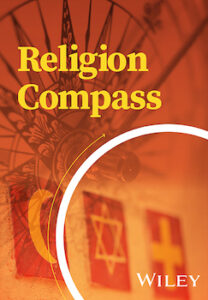 Assistant Professor of Religious Studies
Assistant Professor of Religious Studies
Buddhism and Race in the United States (2021)
Buddhist studies developed alongside the rise of racial sciences and the colonization of so-called “heathen” bodies, lands, and resources. Colonialism, race, and racialization have constituted the ways “real” Buddhism is positioned against “other” Buddhisms. In this article, McNicholl provides an overview of scholarship on Buddhism and race in the United States. Racial whiteness has been constitutive of normative understandings of Buddhism. White normative understandings of religion have also impacted the religious and racial subjectivities of minoritized Buddhists in the United States. If we are to provincialize white religious and racial categories, McNicholl argues we must prioritize the religious and racial subjectivities of Asian American and other racialized Buddhists.
Laurel Schneider
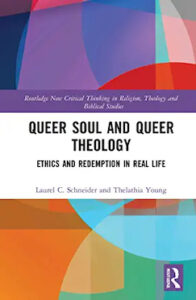 Professor of Religious Studies
Professor of Religious Studies
Queer Soul and Queer Theology: Ethics and Redemption in Real Life (2021)
Along with Thelathia Young of Bucknell University, Schneider takes up the question of Christian queer theology and ethics through the contested lens of “redemption.” Starting from the root infinitive “to deem,” the authors argue that queer lives and struggles can illuminate and re-value the richness of embodied experience that is implied in Christian incarnational theology and ethics. Offering a set of virtues gleaned from contemporary lesbian, gay, bisexual, transgender, intersex, queer, and asexual (LGBTIQA) lives and communities, this book introduces a new framework of ethical reasoning. Battered and wrongly condemned by life-denying theologies of redemption and dessicating ethics of virtue, this book asserts that the resilience, creativity, and epistemology manifesting in queer lives and communities are essential to a more generous and liberative Christian theology.
Richard McGregor
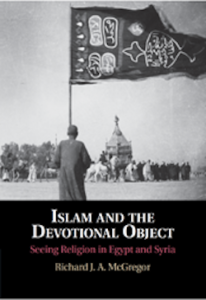 Professor of Religious Studies
Professor of Religious Studies
Islam and the Devotional Object: Seeing Religion in Egypt and Syria (2020)
This book reconstructs a rich material culture that until recently flourished in the Islamic heartlands. Taking materiality as inextricable from metaphysics, this study traces the turbulent lives of key religious objects. Elaborate parades in Cairo and Damascus displayed decorated objects of great value, destined for Mecca and Medina. These included the precious yearly dress sewn for the Ka’ba, and large colorful sedans mounted on camels, which mysteriously would complete the Hajj without carrying a single passenger. Along with the brisk trade in Islamic relics, these objects and the variety of contested meanings attached to them, constituted a material practice of religion that persisted until the colonial interventions of the nineteenth century.
Ira Helderman
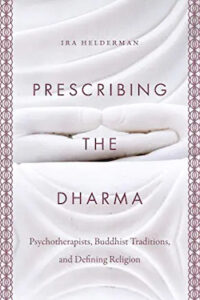 Lecturer of Religious Studies
Lecturer of Religious Studies
Prescribing the Dharma: Psychotherapists, Buddhist Traditions and Defining Religion (2019)
This is the first comprehensive study of the surprisingly diverse ways that psychotherapists have related to Buddhist traditions. Through extensive fieldwork and in-depth interviews with clinicians, many of whom have been formative to the therapeutic use of Buddhist practices, Helderman gives voice to the psychotherapists themselves. He focuses on how they understand key categories such as religion and science. Some are invested in maintaining a hard border between religion and psychotherapy as a biomedical discipline. Others speak of a religious-secular binary that they mean to disrupt. Helderman finds that psychotherapists’ approaches to Buddhist traditions are molded by how they define what is and is not religious, demonstrating how central these concepts are in contemporary American culture.
Anand Taneja
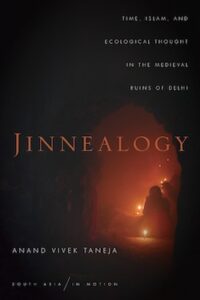 Associate Professor of Religious Studies
Associate Professor of Religious Studies
Jinnealogy: Time, Islam, and Ecological Thought in the Medieval Ruins of Delhi (2017)
This book centers on Firoz Shah Kotla, a ruined medieval palace that has become a prominent dargah, or Muslim saint shrine, in contemporary Delhi. Built circa 1354 and long fallen into disrepair, the widespread popularity of Firoz Shah Kotla as a dargah began in 1977. Firoz Shah Kotla is frequented by both Hindus and Muslims, and the saints venerated at this dargah are not human, but Islamic spirits known as jinn. Visitors write letters of petition to these jinn-saints as if petitioning government officials, including their names, addresses, and passport photos in their appeals. They deposit multiple copies of these letters in various niches and alcoves through the ruins. Firoz Shah Kotla is also a place where another kind of nonhuman life flourishes, especially cats, snakes, and kites. As the jinn are shape-shifters in Islamic mythology, often taking the form of animals, these animals are also imbued with sacrality in this space.
